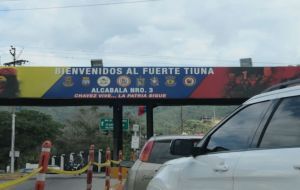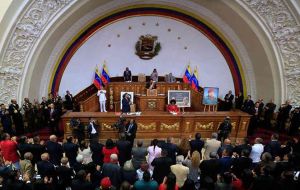MercoPress. South Atlantic News Agency
Several dead in military complex amid revelations of coup plans in Venezuela
 Donald Trump held meetings with a Venezuelan high-ranking military officer and US officials in order to plot a plan to carry out a coup against Nicolás Maduro
Donald Trump held meetings with a Venezuelan high-ranking military officer and US officials in order to plot a plan to carry out a coup against Nicolás Maduro  In the operation, according to the police version, eight of the suspects were shot down and 23 people were arrested
In the operation, according to the police version, eight of the suspects were shot down and 23 people were arrested  When the National Constituent Assembly (ANC) was installed last year they were prepared to strike a blow against Maduro. The plan was aborted because of the fear that it would end in a bloodshed.
When the National Constituent Assembly (ANC) was installed last year they were prepared to strike a blow against Maduro. The plan was aborted because of the fear that it would end in a bloodshed. Eight alleged criminals were killed on Sunday at the most important military complex in Venezuela amid the revelations about plans for a coup supported by the government of the United States.
Members of the Special Actions Forces of the Bolivarian National Police (PNB) of Venezuela fought against supposed criminals in the Fuerte Tiuna Military Complex. The place houses important martial institutions such as the Ministry of Defense and the General Military Prosecutor's Office.
In the operation, according to the police version, eight of the suspects were shot down and 23 people were arrested.
The events are framed by a new series of accusations by the Venezuelan government against the United States. for conspiring against Nicolás Maduro’s government. Venezuelan Foreign Minister Jorge Arreaza reacted on Saturday to a report in The New York Times that details the secret meetings between US and Venezuelan officials seeking to overthrow Maduro.
According to the Times, the president of the United States, Donald Trump, held meetings with a Venezuelan high-ranking military officer and eleven US officials, in order to plot a plan to the overthrow of President Nicolás Maduro with a coup of State against his government.
The story reveals that the Trump administration held secret meetings with a former Venezuelan commander on possible attempts to overthrow Nicolás Maduro. The soldier, who is not identified by the article, is included in the list of sanctioned Venezuelan officials issued by the US Treasury Department.
According to the Venezuelan military, there were three scheduled dates for the capture of Maduro and his closest collaborators. In addition, he assured that at least three groups within the Venezuelan Armed Forces have been conspiring against the government of the president.
The former commander said that when the National Constituent Assembly (ANC) was installed on July 30 last year they were prepared to strike a blow against Maduro. The plan was aborted because of the fear that it would end in a bloodshed.
Another strike was planned to take place during March 2018. However, the operation was not carried out because it was filtered.
For the officer on May 20, the day of the last presidential elections, was another possible date, but once again the information was leaked and the operation was suspended. After that date, there was a wave of arrests of civilians and soldiers in various parts of the country accused of riot and treason.
The soldier contacted by Times lamented the arrests of dozens of soldiers for being suspected of a conspiracy against the president; alleging that, if the US government had not denied the delivery of encrypted radios petitioned by the rebels contacted by Washington, the history of the country today would be different. However, the specialist in military affairs, Rocío San Miguel wrote out against this argument through her Twitter account, explaining that a coup cannot depend on the delivery of such radios.
The idea of establishing communications with leaders of armed forces was not so well regarded by Washington, where, despite the hope that an intervention in the Caribbean country would help to restore democracy and distribute food and humanitarian aid in a country that is experiencing the worst social and economic crisis in its history, there was a considerable risk in building bridges with a military organization accused of becoming one of the world pillars of drug trafficking and abuses of human rights, Mari Carmen Aponte explains, who served as the main diplomat in Latin American affairs during the administration of Barack Obama.
In addition to the reactions of Chancellor Arreaza, who wrote through his Twitter account that he denounced “before the world the plans of intervention and support to military conspiracies of the government of the United States against Venezuela,” only the president of Bolivia, Evo Morales, supported that position.
Although the leaders of the region strongly condemned President Trump's comments last year, saying that there was a “military option” to frustrate Maduro, the region reaction to the story that revealed the meetings between US officials and coup plotters were much smaller. The pressure on the Venezuelan regime and the isolation of the government have changed the diplomatic landscape of the region.




Top Comments
Disclaimer & comment rulesCommenting for this story is now closed.
If you have a Facebook account, become a fan and comment on our Facebook Page!